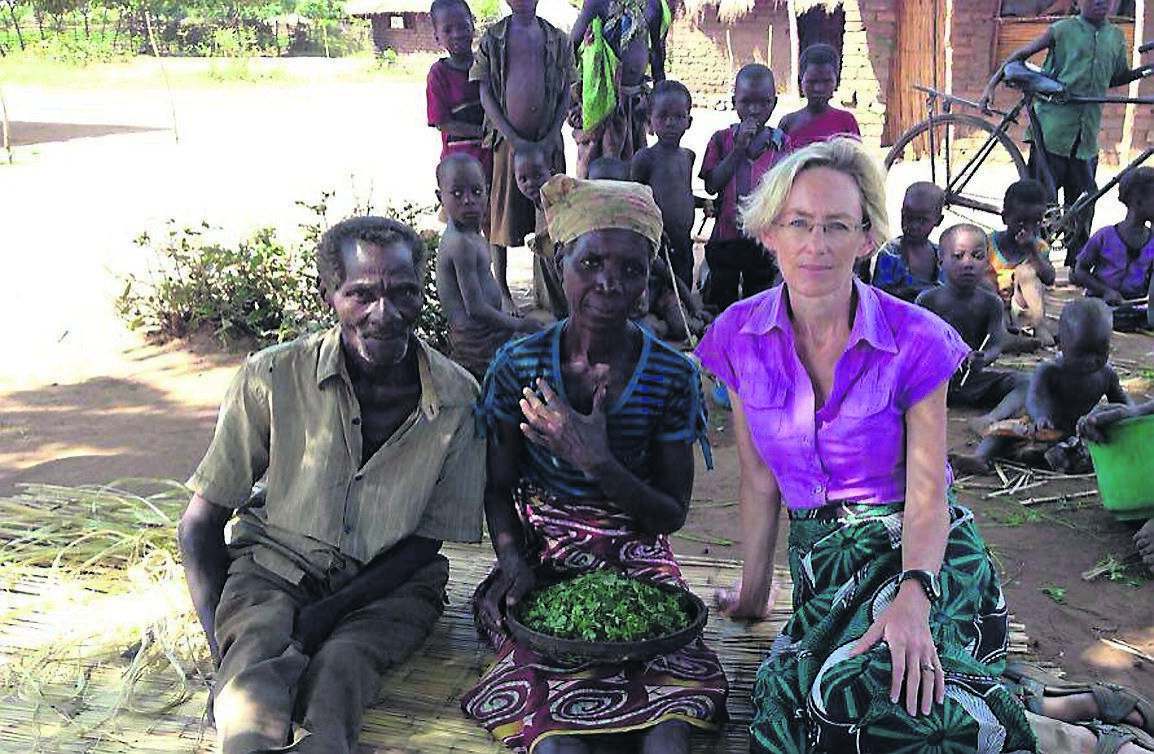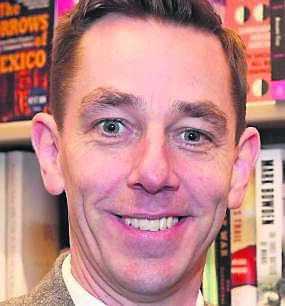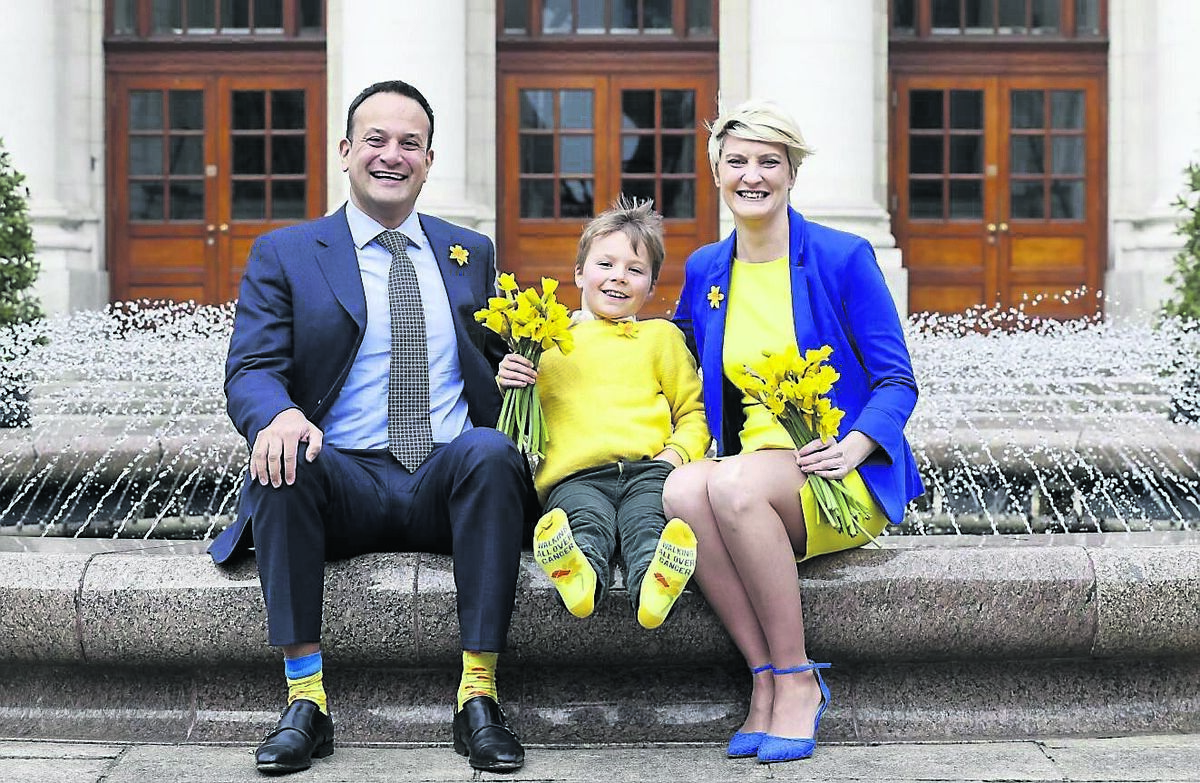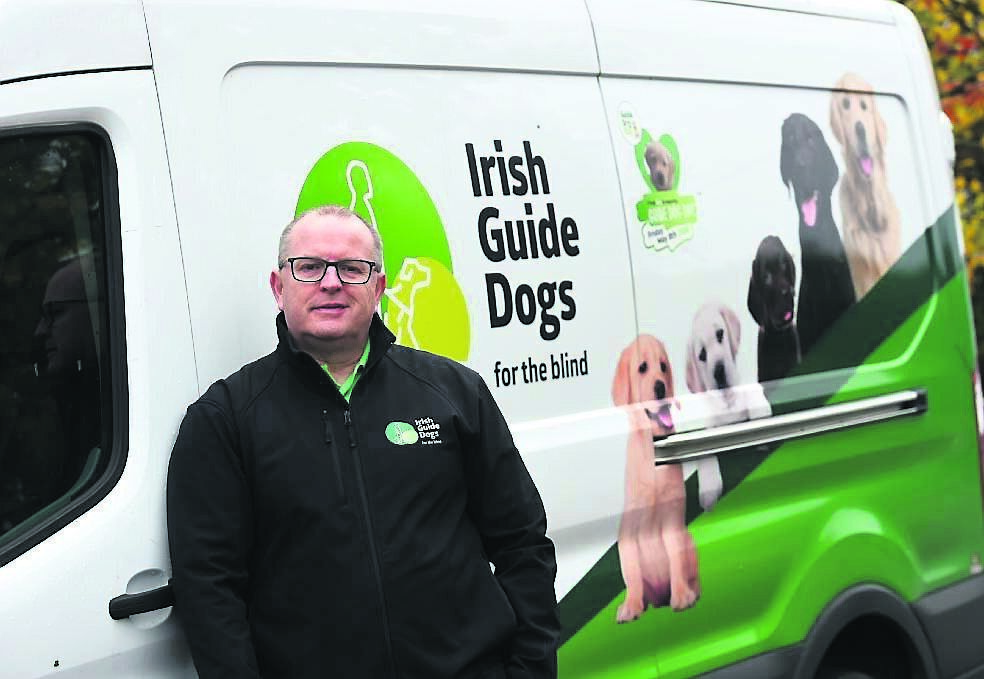Elaine Loughlin: Charities fall on hard times as Covid leaves €445m funds gap

Cork Penny Dinners director Caitríona Twomey, homeless campaigner Fr Peter McVerry, head of School of Education at UCC Fiona Chambers, and Professor Pat Fitzpatrick of UCC during a visit to Cork Penny Dinners facilities before social distancing measures were brought in.
AT a time when people need support more than ever, charities fear they won’t be able to provide services next year.
Looking for a PAWsome #Christmas present? Why not purchase a Gift for Giving and cuddly Guide Dog Puppy?
— Irish Guide Dogs for the Blind (@irishguidedogs) October 19, 2020
Gifts for Giving allows you to make a donation on behalf of someone you care about, while supporting the training and development of our Guide Dogs.https://t.co/wHv88gxh3I pic.twitter.com/6k7cvVpsd7
- The most common charitable purpose of registered charities at the end of 2019 were purposes that are of benefit to the community (54%), followed by the advancement of education (30%), relief of poverty or economic hardship (9%) and religion (7%)
- 52% of charities have an income of more than €100,000, 32% have an income of between €10,000 and €100,000 and 16% have an income of less than €10,000. Of the 2,165 charities reporting an annual income of over €250,000 in 2019
- 875 charities reported an income of more than €1m last year
- 72% of charities on the Register had fewer than 20 volunteers while on the other end of the scale 2% have between 250 and 499 employees
- 43% of charities have no employees while on the other end of the scale 2% have between 250-499 people working for them
While an additional €10m was found as part of Budget 2021, Joe O’Brien, the minister of state for community development and charities, said the Government are “just not in a position to 100% replace all of the funding lost”.
- 55% of respondents said their charity’s finances were uncertain or in difficulty.
- 54% of respondents were concerned that their charity could be unable to continue providing services for more than 6 months
- 68% of respondents said that their charity’s services were restricted as a result of the crisis
- A separate survey of 118 charities conducted by The Wheel in July and August found that 50% have experienced an increase in demand since the outbreak of the pandemic
- 48% of charities surveyed anticipate an income/funding loss of up to 75% and 12% anticipate an income/funding loss of up to 100% in 2020
- 82% of charities who took part in the survey are “very concerned” about whether they will have sufficient funds to provide their services in 2021
It is expected that Irish charities will be down more than €440m as a result of Covid and the impact it has had on fundraising
If you're searching for that perfect #shoplocal gift, you can order official Irish Cancer Society Face Masks directly from our website.
— Irish Cancer Society (@IrishCancerSoc) October 25, 2020
Order now and help support cancer patients and their families all over Ireland: https://t.co/XXNsJNVVAg 💛 pic.twitter.com/706vFiICcw
Yes, it is absolutely free to call. The service is available Monday-Friday, 10am-1pm. We know it can be hard to talk about grief and how difficult the death of someone close can be but our team of volunteers are here for you. Freephone 1800 80 70 77. In partnership with @HSELive pic.twitter.com/8WoWI5vVMs
— Irish Hospice Foundation (@IrishHospice) October 21, 2020
Thank you to everyone who has already signed up to this year's @CalcuttaRun to raise money to tackle homelessness in Dublin and Kolkata.
— Peter McVerry Trust (@PMVTrust) October 21, 2020
Sign up to this year's #virtualcalcuttarun2020 taking place from the 30th Oct - 8th Nov, led by @LawSocIreland - https://t.co/UZciqf9hfg pic.twitter.com/lqSQxrXohS
Trócaire CEO
Like most charities and businesses, 2020 has been the most challenging year we’ve ever experienced. Lockdown happened in the middle of our Lenten appeal so it was the worst possible time for us. Around two-thirds of donations to Trócaire during Lent come from schools and parishes so the fact that both of them were closed immediately put up to €5m of donations at risk.
We were facing the prospect of our appeal being 60% down on previous years. That would have had a devastating impact on our work.
The Trócaire boxes were distributed prior to lockdown but people had no way to return them. In May we asked supporters to count or estimate what was in their Trócaire box and donate through our website instead.
The reaction from supporters around the country was incredible. When people heard how at risk our programmes were, they really rallied around us. People came up with really inventive ways to raise money for us.

A doctor in Northern Ireland, Martin McMullen, walked the length of the Camino in his driveway and raised £50,000. A priest in north Dublin, Fr Paul Thornton, organised a drive-thru Trócaire box delivery, where people could deposit their boxes in a socially distanced manner, and that saw over €8,000 donated.
Our Lenten Appeal is down €1m, which is a very significant hit although thankfully not as bad as we feared in March and April. We’re immensely grateful that people in Ireland remain so committed to Trócaire despite the challenges they are facing in their own lives.
Trócaire is fighting the spread of Covid-19 in 17 of the world’s poorest countries. We’re providing soap, water, and public health training to people, as well as providing vital support like food and water to people who have tested positive for the virus and are self-isolating.
The long-term impacts of this crisis will be enormous for the poorest people in the world. People already living in desperately poor conditions have lost jobs, have been unable to buy seeds and haven’t had local markets to sell goods at.
Our Christmas Appeal will raise funds for us to continue to support people over the coming months. Our Christmas Appeal is always very important but particularly this year.
Despite the difficult challenges during Lent, we’re hopeful that if people get behind our Christmas Appeal we will be able to implement the life-changing work we had planned for this year.
With Ireland facing more restrictions and a recession, it is clear that we are all in for a difficult period ahead. The whole world is struggling from the same crisis.
A #BindingTreaty on business and human rights would demand..
— trócaire (@trocaire) October 25, 2020
▪️Human rights are prioritised over profits
▪️Give power to communities to stand against exploitation
▪️Provide a global set of rules for businesses
▪️Give strong legal protection against foreign companies pic.twitter.com/KR4jlFXZeE
I think the global nature of this crisis has made people realise how interconnected we are and the importance of supporting the most vulnerable. As Dr Mike Ryan says, none of us are safe until all of us are safe.
The next few months are going to be incredibly difficult for people who were already living in extreme poverty before this crisis. We hope people will continue to support our efforts this Christmas.
For broadcaster , the outbreak of Covid-19 has shown that Irish people are at their very best when their backs are against the wall.
Over €6m was donated by viewers of The Late Late Show during the first three months of the pandemic.
The chat show host said: “Obviously, Covid changed the nature of how The Late Late Show was going to work, and we were going on a week-to-week basis and realising that a lot of people were at home, and frightened, but they still cared about charities.”
It was with that in mind that The Late Late Show team decided to do something and asked well-known faces including musicians Hozier, Daniel O’Donnell, and Mary Black, and actors Peirce Brosnan and Brendan Gleeson to “come in and fly the flag for the charities which were close to their hearts, whether it was St Vincent De Paul, or Focus Ireland, or other charities that we on The Late Late Show found to be very important”.

The host added: “What we didn’t expect was the extraordinary response for these charities, who in normal times would be having fundraising days or shaking a bucket outside a church — all of these things were taken from them and we as a show tried to step in and help.”
Massive amounts were raised through a series of shows which made special appeals, this included more than €500,000 for the The Julian Benson Cystic Fibrosis Foundation, around €1.7m for mental health charity Pieta House, and more than €1.1m for St Vincent de Paul.
“It was one of the upticks of a very dark time, the charities were grateful, we were grateful, and I think people at home could feel good that they were able to help, and contribute, and make a difference.
“It just proved that Irish people — when their backs are at the wall — are often at their very best,” the presenter said.
Covid-19 has had a significant impact on the finances of the Irish Cancer Society. We are currently forecasting that we will be roughly €4m down on what we had planned to raise this year.
Our fundraising initiatives are mostly built around community and in-person events and due to Covid, less and less of these are taking place. This year, the society has had to cancel a number of fundraisers which we had planned. These events are crucial to help us raise funds so that we can continue to offer help and support to the more than 40,000 people who are diagnosed with cancer in
Ireland every year.
In March, our flagship fundraising event, Daffodil Day, was cancelled. Daffodil Day was one of the first major national events to be cancelled just days in advance of the nationwide lockdown. Our initial response as an organisation was to focus on the welfare of those affected by cancer.

However, the public insisted that Daffodil Day still happened in some guise and some amazing individual and virtual efforts were made to continue the tradition.
Unfortunately, despite the incredible efforts of our supporters online, we were still down €2m on what we would hope to raise in a normal year.
We are now extremely concerned about Daffodil Day 2021, as it is such an important factor in our annual fundraising calendar. We are currently working hard on creating a virtual version,but given that so much of the tradition associated with Daffodil Day is the physical coming together of our supporters nationwide, it is really challenging to replicate this source of income.
Our annual breast cancer campaign Cups Against Breast Cancer, which is currently running through the month of October, has experienced a 68% reduction in sign-ups, while our annual Dare to Care campaign has been cancelled due to restrictions.
🎀 Our annual October breast cancer campaign Cups Against Breast Cancer has experienced a 68% reduction in sign-ups because of Covid restrictions.
— Irish Cancer Society (@IrishCancerSoc) October 14, 2020
🎀 You can still support breast cancer patients and our vital services by making a donation today at https://t.co/6nGx5ll4HZ pic.twitter.com/Qcvbq4kRaz
We’re also experiencing a downturn in challenge events, for instance our marathon income has suffered a loss of 66% compared with what we were expecting.
Our 21 charity shops nationwide have also suffered during the pandemic due to closures and are 43% down on budget.
The society is projecting a deficit for 2020, but our big concern is for 2021. We are expecting that the next six to 18 months will be an extremely challenging fundraising environment as the novelty factor of digital fundraising events wears off.
We are asking members of the public to show their support by donating to the Irish Cancer Society online at cancer.ie/donate or call 1850 60 60 60 to ensure that we can meet increased demand for support from people affected by cancer.
The Covid-19 crisis has had a significant impact on our fundraising activities.
Events we would have depended on such as the Cork Summer Show, Bloom in the Park, the Ploughing Championship, and the RDS Show were all cancelled. As were some of our own major fundraisers including Mizen to Malin Cycle, Camino Walk, and Cork Zombie Walk. Our two major campaigns at this time of year, Christmas and our annual car raffle, will be almost exclusively digital given the most recent restriction announced by the Government.

All community fundraising, such as church gate and retail collections, festivals, and fairs, were all cancelled from March onwards. Realistically, we will be very fortunate to be able to return to such activities before the second quarter of 2021. Our priority is the safety of our supporters.
When you consider the loss of such activities against a background where it costs €5m per annum to run the charity and that we are reliant on the public interactions for 85% of these running costs, it’s clear the impact the pandemic has had.
The key figures show:
- 42 dogs are currently going through training. By the end of 2021, a further 100 will be brought through our training programmes.
- 86 puppies currently being puppy raised who need to continue their formal training.
We have over 200 applications for our assistance dog programme when we opened the waiting list in September.
Now more than ever we need support as we aim to change as many lives as we can this year and beyond into 2021 and 2022.
Since the crisis began, we have increased our online activity and that is now our main source of income across our main social media channels and our nationwide branch network’s Facebook pages. We’ve adapted many of our community campaigns, such as Guide Dog Day, and given them a completely digital focus. Similarly, we worked with the family of the late Lorraine Shanahan to turn the Cork Zombie Walk into a virtual Zombie Walk over the Halloween period.
Fortunately, bequests to our organisation have held up. People can see the lasting contribution they are making by leaving a legacy.
Our attention now is on our annual Ford Focus Car Raffle and our Christmas shop, which includes our very much sought-after calendar featuring beautiful photos of dogs and includes stories from our community. Further details can be found at guidedogs.ie.
Looking for ways to support us in the run up to Christmas? You can purchase a Car Raffle ticket to be in with a chance of winning a 2021 Ford Focus, purchase a 2021 Calendar or purchase some Christmas cards on our website.
— Irish Guide Dogs for the Blind (@irishguidedogs) October 14, 2020
Shop now > https://t.co/j006GWOg4F#ChangingLives pic.twitter.com/iMjzAGUMU9
We are driven because of our desire to continue to change the lives of our clients who themselves have also been impacted by the pandemic.
Not alone have many struggled with the isolation of lockdown and restrictions, it’s worth remembering that guide dogs, although highly trained, do not have the ability to physically distance, are unable to recognise one-way systems in shops, and cannot observe signs on public transport stating ‘please don’t sit here’.
This Halloween has brought added difficulties with an unprecedented increase in dogs being adversely impacted by fireworks. In some cases, it can end a dog’s working life, leaving their owner without a dog which means they lose their independence and mobility.
The most obvious change to how Alone works is the reduction or removal of the potential for in-person practical and emotional support for older people.
Though Alone’s aim is to empower older people to live happily at home for longer, the role of the support coordinator (older people’s direct contact) to undertake home assessments is a huge part of the process — to fully understand the individual challenges and support
accordingly.
In addition, the reduction of social interaction means that mental health concerns have risen as well as a need to address social health
determinants to prevent contact with Covid-19.
However, like our third-sector peers, we have adapted. All staff were moved to remote work within one week, with no gap in services. This is
testament to the role of technology for all in coping with the pandemic.
Having supported 5,000 older people in 2019, Alone are supporting 14,000 as of October 2020. These numbers are a reflection of both the greater need for Alone’s services in this period but also on how the increased awareness of Alone in the last eight months has led to older people reaching out, based on existing need.
ALONE is encouraging older people who need advice to call ALONE on, 0818 222 024 from 8am-8pm, seven days a week. The helpline is available to all older people including those who have not used ALONE’s services previously. #YouAreNotAlone pic.twitter.com/yiRGKN0s35
— ALONE (@ALONE_IRELAND) October 24, 2020
This increase in numbers means the need for funding has similarly increased. Stalwart annual events such as the womens mini marathon, Hell & Back, and the Dublin marathon are either virtual or cancelled altogether. In-house events such as physical challenges, such as You’ll Never Abseil Alone at Croke Park, have been put on hold.
Alone have built longer term relationships with a number of corporate organisations for two or three years. Events were planned throughout the years to work towards a common goal. The ability to create and host those events, with older people often in attendance, has disappeared.
Christmas will bring the biggest change due to events with companies who support Alone having to be cancelled. Last year, for example, we supported 16 social events with older people sponsored by corporate organisations. These ranged from turning on the lights on the Docklands to Christmas concerts at the National Concert Hall followed by Christmas lunch.
Our cinema club, for example, which is volunteer run, will no longer have its festive outing. Events such as these were looked forward to by staff and service users alike and are a huge part of the funding potential and overall wellbeing of the older people at Christmas.
The pandemic has meant adapt, adapt, adapt. Our supporters have done just that. We have seen a huge support for physical virtual challenges as everyone turned to the outdoors for solace and companionship.
Our current loneliness — it's of a different order to the old malaise | @MikeMoynihanEx #COVID19ireland https://t.co/lEbt2KV1Id
— Irish Examiner (@irishexaminer) October 15, 2020
Volunteers have reached out to their companies as advocates for support and this has led to new partnerships with companies through community efforts.
As always, communities have been highly creative, from making and selling masks to climbing Everest on a bike (virtually) as a team. Alone’s priority now is to sustain and build that support so we can continue to support the additional 8,000 older people linked to Alone since March.





